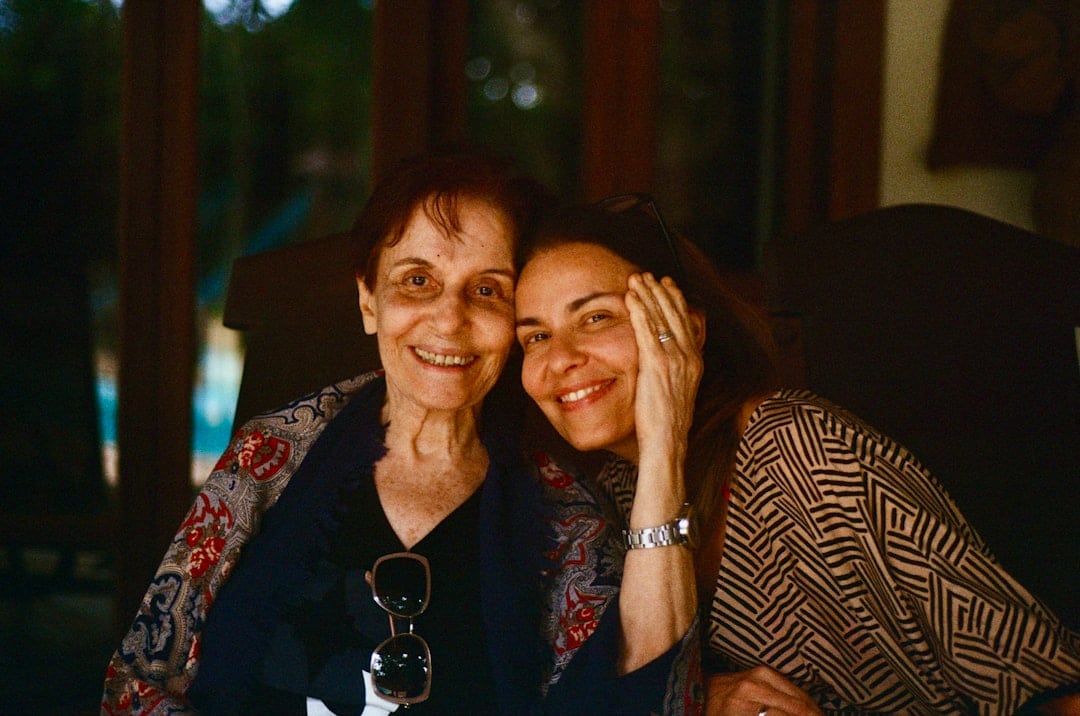Navigate Alzheimer's long term care options with our guide. Find signs, choose facilities, understand costs & support for your loved one.
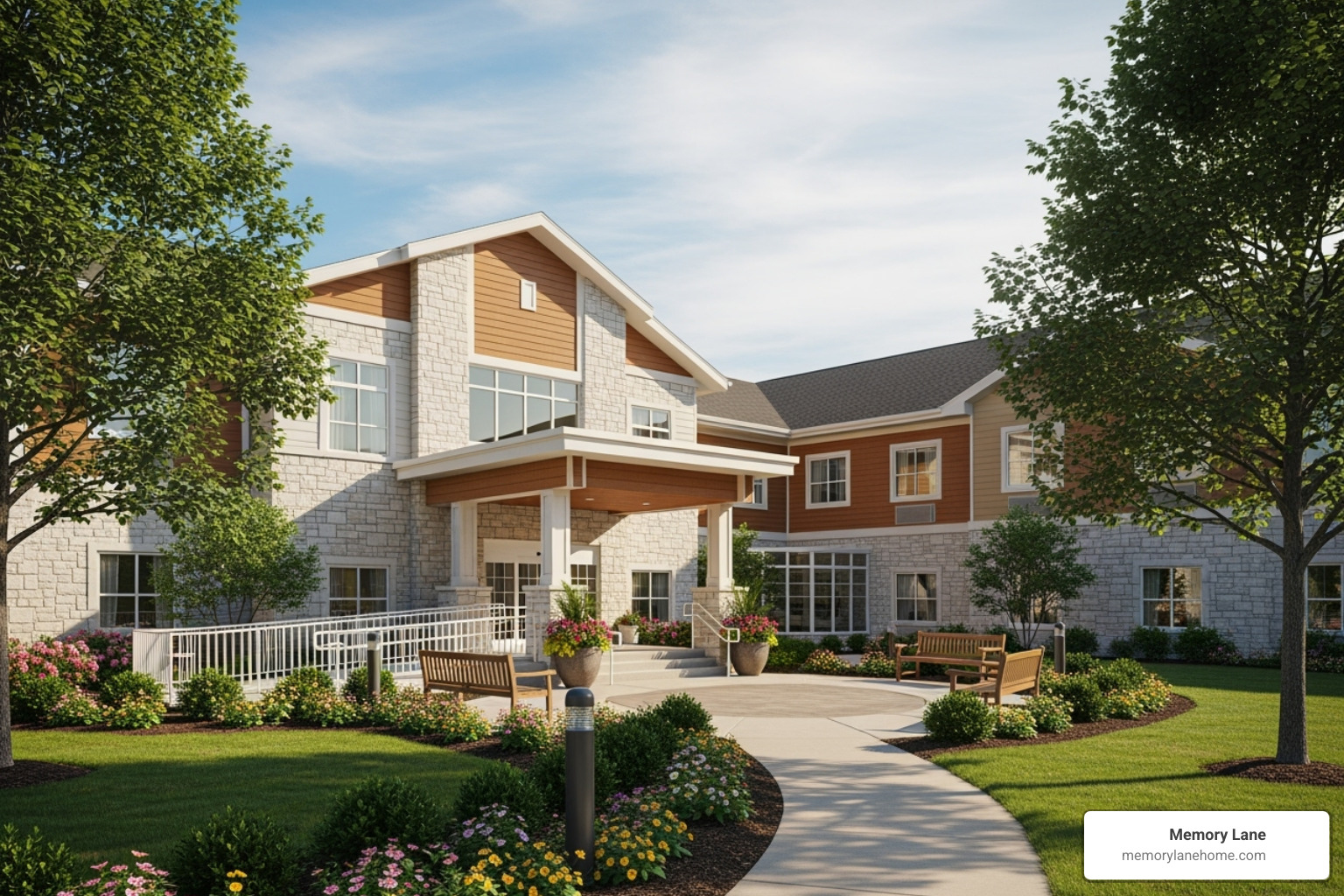
Navigating Memory Loss: Your Guide to Assisted Living Options
Memory Loss Assisted Living 2025: Ultimate Guide
Why Choosing the Right Memory Loss Assisted Living Matters
Choosing the right memory loss assisted living is a critical decision. When a loved one shows signs of cognitive decline, you face a choice between standard assisted living and specialized memory care.
Quick Comparison:
| Aspect | Assisted Living | Memory Care |
|---|---|---|
| Best For | Mild memory issues, early-stage dementia | Moderate to advanced dementia, Alzheimer’s |
| Security | Standard building access | Secured entries, wandering management |
| Staff Training | Basic care assistance | Specialized dementia training (78% of communities) |
| Average Cost | $5,190/month | $6,450/month |
| Environment | General senior community | Dementia-friendly design, enclosed courtyards |
The difference is significant. As one senior living guide notes, “When someone you love begins to show signs of memory loss, you want to do whatever you can to make their days easier and less frustrating.” Standard assisted living often isn’t equipped for the specific needs of memory loss. Residents may struggle with navigation, feel isolated, or become unsafe if they wander.
In contrast, memory care facilities offer critical features like wandering management systems (91%), secure environments (88%), and specialized staff training for dementia care (78%). These communities use structured routines and dementia-friendly designs to reduce confusion and support independence. While memory care costs about $1,260 more per month on average, this premium covers the improved security, specialized programs, and trained staff that dramatically improve quality of life and safety.
I’m Jason Setsuda, an Emergency Medicine Physician and CFO of Memory Lane Assisted Living. With over a decade in medicine, I’ve seen how the right memory loss assisted living environment transforms resident well-being and gives families peace of mind.
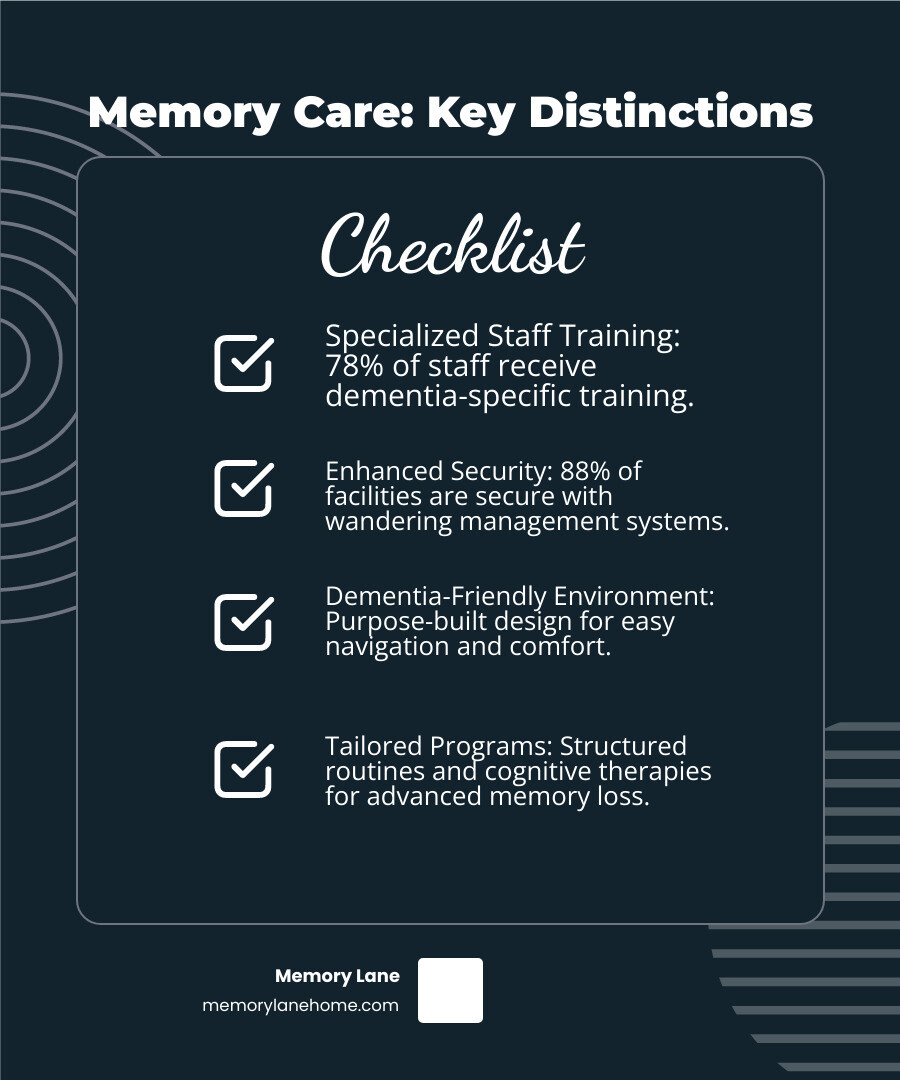
Understanding the Core Differences: Assisted Living vs. Memory Care
When a loved one shows signs of memory loss, you face unexpected decisions. Should they move to assisted living or memory care? Understanding the difference is key, as the right environment can transform your loved one’s daily experience and your peace of mind.
While both options provide housing, meals, and daily help, the level of specialized support, physical environment, and staff training differ dramatically.
| Aspect | Assisted Living | Memory Care |
|---|---|---|
| Target Resident | Seniors who need help with Activities of Daily Living (ADLs) but are largely independent and do not have significant cognitive impairment. May include individuals with mild, early-stage memory issues who are still able to self-manage. | Individuals with moderate to advanced Alzheimer’s disease or other forms of dementia who require specialized, secure environments and staff trained in cognitive impairment. |
| Level of Care | Provides support with ADLs like bathing, dressing, medication management, and meal preparation. Focuses on maintaining independence and offering a social community. Staff is available 24/7 for emergencies. | Offers all assisted living services plus highly specialized, 24/7 supervision and care custom to the unique challenges of memory loss. Includes managing behavioral changes and ensuring safety. |
| Staff Training | Staff are trained in general senior care, assistance with ADLs, and emergency response. | Staff receive extensive, specialized training in dementia care, including understanding the progression of cognitive decline, managing challenging behaviors, and communicating effectively with individuals with memory loss. |
| Environment | Generally open communities with various amenities, social spaces, and apartment-style living. Residents typically have freedom of movement within the community. | Secure, often self-contained units or wings within a larger community, designed with features like secured entries, enclosed courtyards, and way-finding cues to prevent wandering and reduce confusion. |
| Activities | Focus on social engagement, recreational activities, and maintaining an active lifestyle, often including outings and group events. | Specialized activities and therapeutic programs (e.g., reminiscence, music, art therapy) designed to stimulate cognitive function, reduce agitation, and provide purposeful engagement for individuals with memory impairment. |
| Cost | National median monthly cost is $5,190. | National median monthly cost is $6,450, reflecting the increased specialization, security, and staff training. |
Both care types support Activities of Daily Living (ADLs)—essential self-care tasks like bathing, dressing, and eating. The real difference lies in how that support is delivered. Assisted living is for seniors who value independence but need a helping hand, while memory care provides comprehensive, dementia-specific support in a secure, structured setting.
If your loved one is in the early stages of memory loss, resources like the Alzheimer’s Association and the Mayo Clinic offer valuable information for planning ahead.
What is Assisted Living?
Assisted living is a supportive community where seniors live independently while receiving help with tasks that have become difficult. The focus is on independence with support. Residents have private rooms, enjoy a social life, and receive personalized care when needed.
Key services include help with ADLs (bathing, dressing), medication management, daily meals in a communal setting, and housekeeping and laundry. A full calendar of social activities, from fitness classes to group outings, helps residents stay engaged. Assisted living works well for seniors who are relatively independent, including those with mild memory issues who can still steer the community safely.
What is Specialized Memory Care?
Memory loss assisted living, or specialized memory care, is designed for individuals with Alzheimer’s disease or other forms of dementia. It goes beyond general support to create a highly structured, secure, and therapeutic environment.
At Memory Lane, our communities provide 24/7 supervision and support to ensure safety and respond to the changing needs of cognitive decline. Security is built into the environment with features like keypad entries and wandering management systems to prevent residents from getting lost. About 91% of memory care communities feature these systems.
Our programs are specifically designed for Alzheimer’s and dementia, and a higher staff-to-resident ratio ensures each person receives individualized attention. Structured routines are central to memory care, as a predictable schedule reduces anxiety and provides a sense of stability. As experts note, a specialized setting offers “the resources, staff and support that is specifically designed to benefit those with cognitive issues.” It’s about preserving dignity and enhancing quality of life.
A Closer Look at Specialized Memory Care Environments
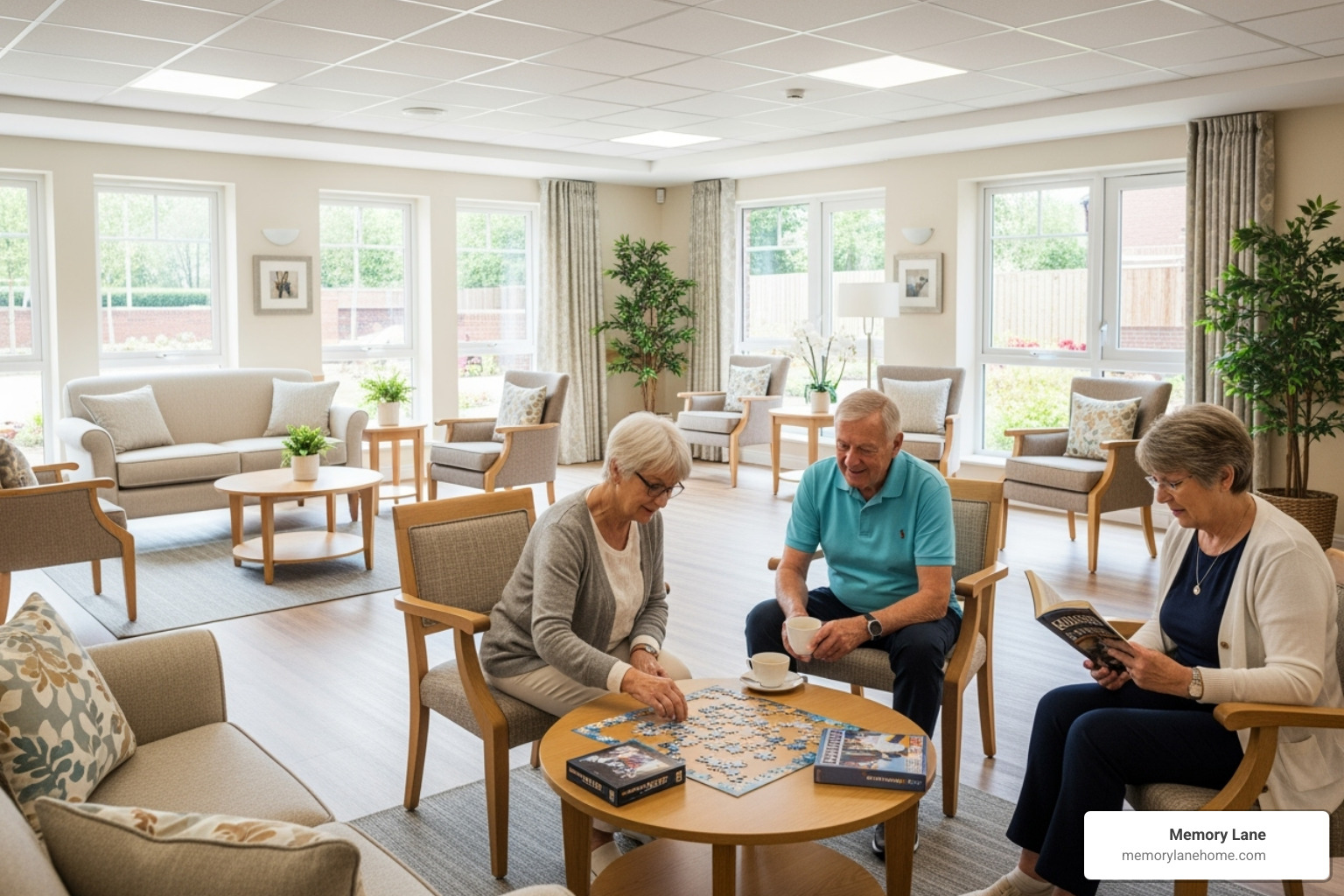
A specialized memory loss assisted living community is a therapeutic environment where safety, engagement, and comfort support individuals with cognitive impairment. The goal is to help residents feel secure, valued, and connected. Every detail, from the layout to the activities, is designed to support quality of life.
Improved Safety and Security Features
For families, safety is a primary concern. The tendency to wander is one of the most dangerous aspects of dementia, which is why security is essential in memory loss assisted living.
Our facilities incorporate multiple layers of protection. Wandering management systems (used in 91% of communities) alert staff if a resident approaches an exit. Keypad entries and alarmed doors control access, while enclosed courtyards allow residents to enjoy the outdoors safely. 24/7 monitoring by trained staff ensures that help is always available. We also offer specialized behavioral support to compassionately manage dementia-related behaviors like anxiety, agitation, or exit-seeking. These measures provide priceless peace of mind for families.
Specialized Staff Training and Support
Caring for someone with dementia requires a unique skill set. That’s why specialized dementia care training, provided by 78% of memory care communities, is the foundation of our approach. Our staff learn about the progression of dementia and evidence-based ways to provide support.
A critical skill is managing challenging behaviors by de-escalating situations gently and identifying unmet needs. Caregivers also use specific communication techniques, speaking slowly and clearly while interpreting non-verbal cues. At the heart of our approach is person-centered care, which focuses on each resident’s individual life story and preferences. By building relationships through consistent assignments, our caregivers build trust and provide familiar comfort.
For families seeking more information, the Alzheimer’s Association and the Mayo Clinic offer comprehensive resources on dementia symptoms.
Unique Activities and Therapeutic Programs
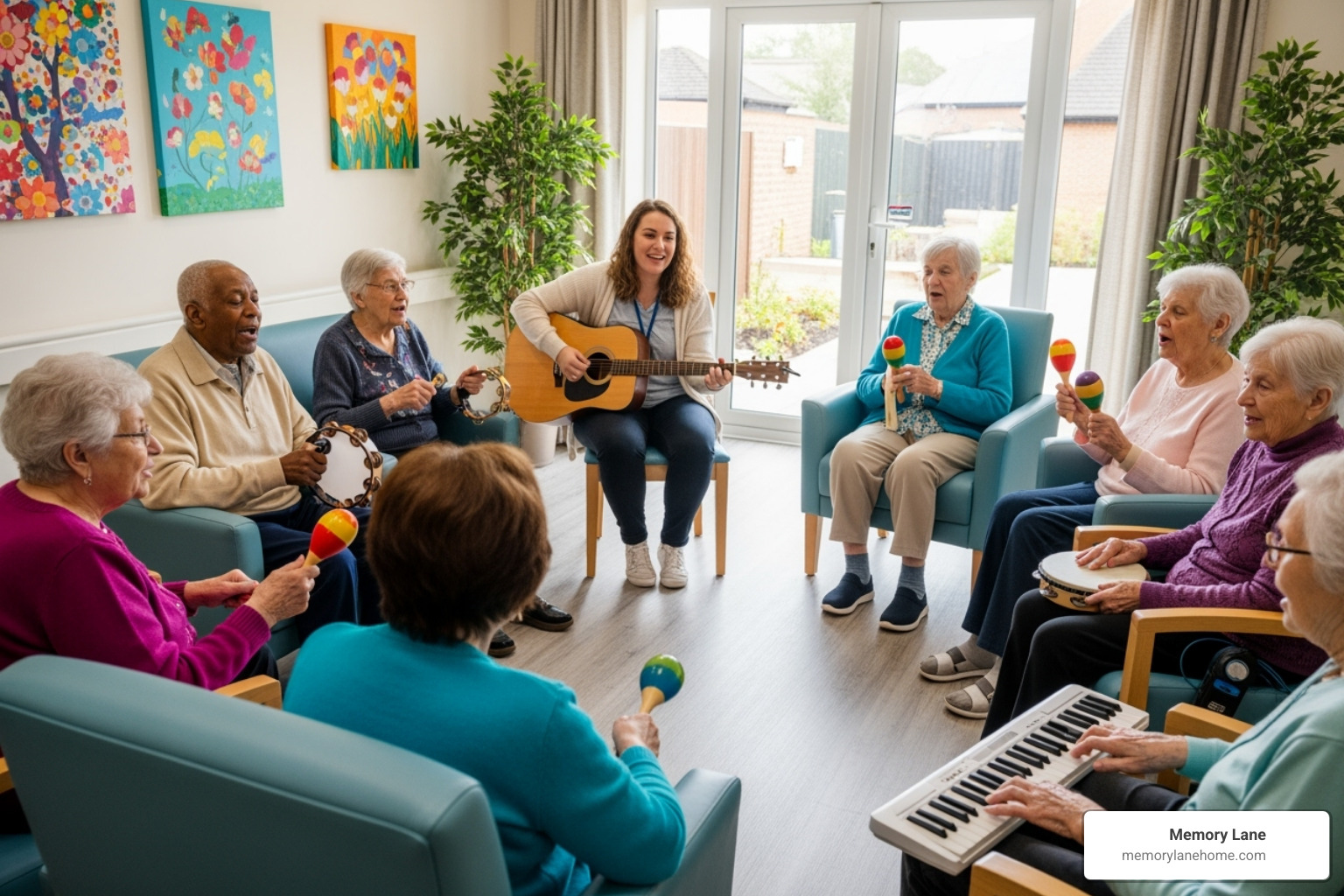
Activities in memory care are purposeful, therapeutic interventions. Our programs are custom to the abilities of individuals with memory loss, creating moments of joy and purpose.
Structured activities provide a predictable daily rhythm that reduces anxiety. Reminiscence therapy uses old photos and music to tap into long-term memories, sparking conversation. Creative outlets like music therapy and art therapy (offered in ~79% of communities) allow for expression when words fail. Sensory stimulation, pet therapy, and gentle fitness classes (offered in ~80% of communities) soothe, comfort, and maintain physical health. Some communities also use light therapy to help regulate sleep patterns and reduce sundowning. This level of engagement is an essential component of quality dementia care.
Purpose-Built Physical Environment
The physical environment in a memory loss assisted living community is intentionally designed to reduce confusion and support independence.
Dementia-friendly design often features circular layouts to eliminate dead ends and color-coded walls to serve as navigation cues. Memory boxes outside each resident’s room, filled with personal mementos, help them identify their own space. The goal of easy navigation is to create a supportive, calming atmosphere. We avoid confusing decor like busy patterns or mirrors that could be disorienting. Safe outdoor spaces, like enclosed gardens, are also crucial, allowing residents to experience nature securely. These design elements help residents thrive by working with their cognitive abilities, not against them.
The Financial Aspect: Comparing Costs and Payment Options
Understanding the costs of memory loss assisted living is a crucial part of planning. The national median for standard assisted living is about $5,190 per month, while memory care averages $6,450 per month. These figures can vary by location, as shown in resources like the Genworth Cost of Care Survey.
The extra $1,260 per month for memory care covers a significant increase in service level. This premium pays for dementia-trained staff, higher staff-to-resident ratios, advanced security features like wandering management systems, purpose-built environments, and specialized therapeutic programs that standard communities don’t offer.
Most families use a combination of sources to pay for care. Private pay from savings or retirement funds is most common. However, other options may be available:
- Long-term care insurance policies often cover memory care, but benefits vary.
- Veterans benefits, particularly the Aid and Attendance benefit, can provide significant financial assistance to eligible veterans and spouses.
- Medicaid may help with costs for those who meet strict income and asset requirements, but not all communities accept it, and rules vary by state. Medicare, however, does not cover long-term residential care.
It’s wise to explore these financial options early. Consulting an elder law attorney or your local Area Agency on Aging can provide valuable guidance.
Making the Right Choice: When to Transition to Memory Loss Assisted Living

The decision to move a loved one into memory loss assisted living is difficult, often prompted by caregiver burnout or growing safety concerns. As dementia is progressive, it’s important to be honest about your loved one’s current and future needs to determine when more specialized support is required.
Signs Assisted Living May No Longer Be Enough
If your loved one is in standard assisted living, certain signs indicate it may no longer be the right fit.
- Increased confusion and disorientation in familiar surroundings.
- Wandering or exit-seeking behavior, which poses a serious safety risk in unsecured facilities.
- New safety concerns, such as more frequent falls or misuse of household items.
- Behavioral changes like aggression, agitation, or restlessness that overwhelm staff who lack dementia-specific training.
- Social isolation as communication becomes difficult, leading to withdrawal from activities and depression.
- Difficulty navigating the community, which can cause frustration and anxiety, as noted by the Alzheimer’s Society.
When these signs appear, it’s time to consider the specialized environment that memory loss assisted living provides.
Key Considerations for Your Loved One’s Memory Loss Assisted Living Needs
Choosing the right memory care community means finding a place that can meet your loved one’s evolving needs. Start with a doctor’s assessment to understand their diagnosis and the likely dementia progression rate.
Safety must be your top priority. When touring, ask about secured perimeters, wandering management, and fall prevention. However, quality of life and social needs are just as important. Look for communities with activities designed for cognitive impairment.
When you visit, ask these key questions:
- What kind of training does your staff have in dealing with dementia patients?
- What is the staff-to-resident ratio, especially during peak times and overnight?
- How does the staff handle challenging behaviors like aggression or anxiety?
- Are there separate costs involved with the memory care unit?
- What special directives are in place for those with memory loss?
- How are families informed of changes in a resident’s condition and care needs?
- Are activities available on weekends or evenings, and are they designed to meet specific needs and interests?
- What is the discharge policy?
- Is continuing care available as a resident’s needs change?
The Medicare nursing home checklist offers more helpful questions.
The Benefit of a Combined Community
Choosing a community that offers both assisted living and memory care provides a continuum of care. This allows your loved one to age in place, transitioning to a higher level of care without the trauma of moving to a new facility.
Avoiding traumatic moves is crucial for someone with dementia, as a new environment can cause severe confusion and anxiety. Staying in the same community provides familiarity with staff and environment, which offers comfort and stability. This seamless transition allows you to plan proactively instead of reacting to a crisis. At Memory Lane, our integrated approach provides this flexibility and peace of mind, ensuring the right level of care at every stage.
Frequently Asked Questions about Memory Loss Assisted Living
Here are answers to some of the most common questions families have about memory loss assisted living.
What is the main difference between assisted living and memory care?
The main difference is specialization and security. Assisted living helps seniors with daily tasks in a social, independent setting. Memory care is a secure, structured environment with specially trained staff and therapeutic activities designed for individuals with Alzheimer’s or dementia. It provides 24/7 supervision to manage the unique safety and behavioral needs associated with cognitive decline.
Does Medicare pay for memory loss assisted living?
No, Medicare does not typically cover long-term residential or “custodial” care in assisted living or memory care. It may cover short-term skilled nursing care after a qualifying hospital stay, but ongoing residential costs are usually paid through private funds, long-term care insurance, or Veterans benefits. Medicaid may be an option for those who meet strict financial requirements, but coverage varies by state.
How do I know it’s the right time for memory care?
The decision often comes down to safety. It’s time to consider memory care when you can no longer keep your loved one safe in their current environment. Key signs include wandering or trying to leave the home, significant behavioral changes like aggression or agitation, frequent falls, or deep social isolation. If you, as a caregiver, are experiencing burnout from the demands of 24/7 supervision, that is also a strong indicator that professional, specialized care is needed. Trust your instincts and consult with your loved one’s doctor to make a proactive decision.
Conclusion: Finding a Compassionate and Secure Home
Choosing the right memory loss assisted living environment is one of the most important decisions your family will make. The key is to find a community that prioritizes both safety and quality of life through a secure environment, dementia-trained staff, and therapeutic programs.
Specialized support isn’t about giving up; it’s about providing the right framework for your loved one to live their best possible days. A person-centered approach adapts to changing needs while maintaining the comfort of familiar routines and faces.
At Memory Lane, our communities in Ann Arbor, Ypsilanti, and Saline are built on these principles. Our staff receive extensive dementia care training, our environments are secure and thoughtfully designed, and our activities are crafted to engage and bring joy. We see the whole person, not just the diagnosis, and partner with families to provide compassionate, 24/7 care.
Your loved one deserves a place where they are safe, engaged, and valued.
Learn more about our dementia care services and find how Memory Lane can provide the specialized memory loss assisted living environment that brings peace of mind to your family and quality of life to your loved one.

